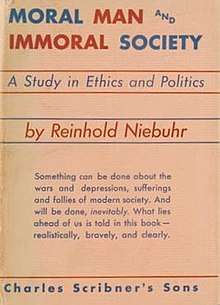Moral Man and Immoral Society
Moral Man and Immoral Society: A Study in Ethics and Politics is a 1932 book by Reinhold Niebuhr, an American Protestant theologian at Union Theological Seminary (UTS) in New York City.[1] The thesis of the book is that people are more likely to sin as members of groups than as individuals.[2] Niebuhr wrote the book in a single summer.[3] He drew the book's contents from his experiences as a pastor in Detroit, Michigan prior to his professorship at UTS.[4] The book attacks liberalism, both secular and religious, and is particularly critical of John Dewey[5] and the Social Gospel.[6] Moral Man and Immoral Society generated much controversy and raised Niebuhr's public profile significantly.[7] Initial reception of the book by liberal Christian critics was negative, but its reputation soon improved as the rise of fascism throughout the 1930s was seen as having been predicted in the book.[8] Soon after the book's publication, Paul Lehmann gave a copy to Dietrich Bonhoeffer, who read it and was impressed by the book's thesis but disliked the book's critique of pacifism.[9] The book eventually gained significant readership among American Jews because, after a period of considerable anti-theological sentiment among Jews in the United States, many Jews began to return to the study of theology and, having no Jewish works of theology to read, turned to Protestant theological works.[10]
 First edition cover | |
| Author | Reinhold Niebuhr |
|---|---|
| Country | United States |
| Language | English |
| Subjects | |
| Published | 1932 (Charles Scribner's Sons) |
| Media type | |
See also
References
Notes
- Pianko 2010, p. 117.
- Crouter 2010, p. 48.
- Rasmussen 1981, p. 10.
- Gill 2006, p. 143.
- Rice 1993, p. 17.
- Stumme 2006, p. 100.
- Brown 1987, p. xv.
- Dorrien 2003, p. 459.
- Bethge 1999, p. 268.
- Goldy 1990, p. 53.
Bibliography
- Bethge, Eberhard (1999). Dietrich Bonhoeffer: A Biography. Minneapolis, Minnesota: Augsburg Fortress. ISBN 978-1-4514-0742-6.CS1 maint: ref=harv (link)
- Brown, Robert McAfee (1987). The Essential Reinhold Niebuhr: Selected Essays and Addresses. New Haven, Connecticut: Yale University Press. ISBN 978-0-300-16264-6.CS1 maint: ref=harv (link)
- Crouter, Richard (2010). Reinhold Niebuhr: On Politics, Religion, and Christian Faith. Octord: Oxford University Press. ISBN 978-0-19-977969-7.CS1 maint: ref=harv (link)
- Dorrien, Gary J. (2003). The Making of American Liberal Theology: Idealism, Realism, and Modernity, 1900-1950. Louisville, Kentucky: Westminster John Knox. ISBN 0664223559.CS1 maint: ref=harv (link)
- Gill, Robin (2006). A Textbook of Christian Ethics. A & C Black. ISBN 978-0-567-03111-2.CS1 maint: ref=harv (link)
- Goldy, Robert G. (1990). The Emergence of Jewish Theology in America. Bloomington, Indiana: Indiana University Press. ISBN 978-0-253-32601-0.CS1 maint: ref=harv (link)
- Pianko, Noam (2010). Zionism and the Roads Not Taken: Rawidowicz, Kaplan, Kohn. Bloomington, Indiana: Indiana University Press. ISBN 978-0-253-22184-1.CS1 maint: ref=harv (link)
- Rasmussen, Larry (1981). Reinhold Niebuhr: Theologian of Public Life. Minneapolis, Minnesota: Augsburg Fortress. ISBN 978-1-4514-1282-6.CS1 maint: ref=harv (link)
- Rice, Daniel F. (1993). Reinhold Niebuhr and John Dewey: An American Odyssey. Albany, New York: State University of New York Press. ISBN 978-0-7914-1345-6.CS1 maint: ref=harv (link)
- Stumme, Wayne (2006). The Gospel of Justification in Christ: Where Does the Church Stand Today?. Grand Rapids, Michigan: William B. Eerdmans Publishing Company. ISBN 978-0-8028-2690-9.CS1 maint: ref=harv (link)